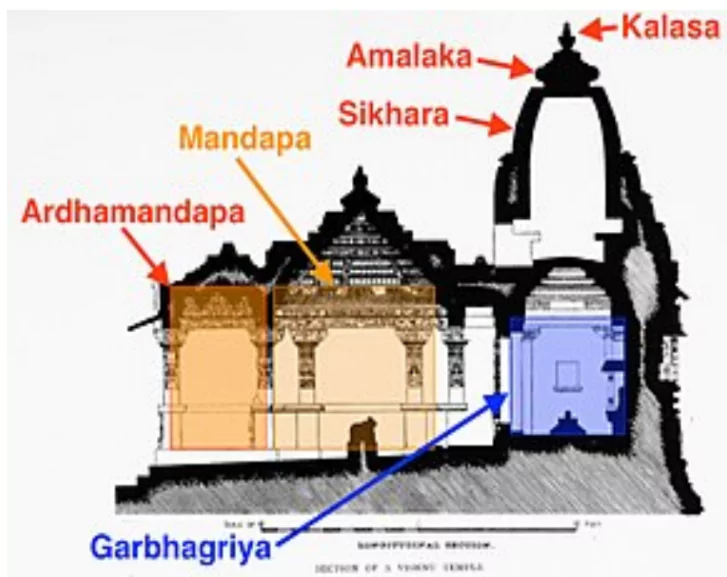Introduction
Temple architecture encompasses a diverse range of religious structures dedicated to worship across various cultures and civilizations, showcasing unique design elements, symbolism, and spiritual significance.
Early Temples
- Brahmanical temples and sacred images became more popular along with the continuous construction of stupas. Each temple featured a principal deity image.
- The temple shrines came in three types:
- Sandhara (without Pradikshinapatha)
- Nirandhara (with Pradikshinapatha)
- Sarvatobhadra (accessible from all sides)
Enroll now for UPSC Online Course
Notable Temples
- Deogarh in Uttar Pradesh, Eran, Nachna-Kuthara, and Udayagiri near Vidisha in Madhya Pradesh.
- These temples, characterized by simplicity, typically comprised a veranda, a hall, and a shrine at the rear.
|
Structure of the Hindu Temple

- Sanctum (Garbhagriha): The sanctum, initially a small cubicle with a single entrance, evolved into a larger chamber over time.
- It is designed to house the main icon.
- Entrance (Mandapa): The entrance to the temple, whether a portico or collonaded hall, serves as a space for accommodating a large number of worshippers.
- Architectural Elements: In freestanding temples, a mountain-like spire is featured, taking the form of a curving Shikhar in North India and a pyramidal tower known as a vimana in South India.
- Vahan and Dhvaj: Positioned axially before the sanctum, the vahan represents the mount or vehicle of the main deity, accompanied by a standard pillar, or Dhvaj.
Evolution of Temple Architecture
- Progression: During the Gupta period, there was a gradual progression of temples from flat-roofed monolithic temples in the initial stages to the sculptured shikhara in the later years.
- Progression can be distinguished into 5 stages:
- First Stage: The temples were square in shape with a flat roof.
- The entire structure was built on a low platform.
- Second Stage: The platforms were higher or upraised. Two-storied temples have been found.
- An important addition was a covered ambulatory passageway around Garbhagriha called a Pradakshinapath.
- Example: Parvati temple at Nachnakuthara (Madhya Pradesh)
- Third Stage: Emergence of Shikharas in place of a flat roof. Panchayatan style of temples was introduced.
- Fourth Stage: Similar to the third stage, except that the main shrine became more rectangular.
- Example: Ter temple in Maharashtra.
- Fifth Stage: Circular temples with shallow rectangular projections were introduced.
- Example: Maniyar math at Rajgir.
Styles of Temple Architecture
- Two distinct orders of temples prevail
- Nagara in the north
- Dravida in the south.
- Vesara style: They differ in architectural features and spire shapes.
- Some scholars recognise the Vesara style as an independent form resulting from the selective integration of Nagara and Dravida elements.
Enroll now for UPSC Online Classes
Conclusion
- Temple architecture serves as a testament to human devotion, cultural identity, and architectural ingenuity, fostering spiritual connections and preserving traditions through sacred spaces that inspire awe and reverence.
